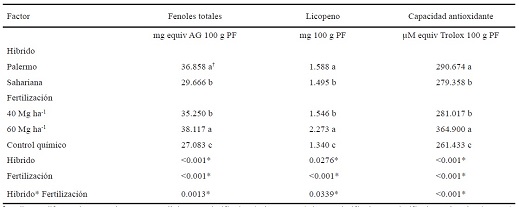Organic fertilization to improve nutraceutical quality of tomato hybrids and its ef fect on the chemical properties of the soil
DOI:
https://doi.org/10.28940/terra.v40i0.1613Keywords:
organic fertilizers, protected agriculture, antioxidant capacity, Solanum lycopersicum L.Abstract
Tomato is the most cultivated horticultural product in the world, its consumption has benef its for human health due to its antioxidant content. To meet the global demand for its consumption, protected agriculture production systems are used with chemically synthesized fertilization sources. Due to the high monetary and environmental cost, alternative sources of fertilization must be found, such as organic fertilizers that minimize the environmental impact and genotypes that are more productive. One of these sources is bovine manure, which is abundant in Comarca Lagunera. The aim of this study was to determine the best dose of solarized manure to increase yield and nutraceutical quality of two tomato hybrids under shade mesh conditions. The treatments corresponded to a factorial experiment, which consisted of the combination of the Palermo (Vilmorin®) and Sahariana (Syngenta®) saladette tomato hybrids and doses of bovine manure (40, 60 Mg ha-1), as well as a chemical fertilization as control (CQ) (280‑50-00 N-P2O5-K2O) with three repetitions. The results indicate a higher content of antioxidants in tomato fruits with the interaction of solarized bovine manure (60 Mg ha-1) and the Palermo hybrid. However, the soil variables (CE, MO, NO3-, NH4+ and PO4-3) increased with the doses of 40 and 60 Mg ha-1 of manure. Hence, the soil should be monitored periodically as these doses can signif icantly inhibit the plant growth of the crop. The best response in antioxidant content was obtained with the interaction of the Palermo hybrid and bovine manure, improving the phytochemical compounds of the tomato fruit.
Downloads
Publication Facts
Reviewer profiles N/A
Author statements
- Academic society
- Terra Latinoamericana
- Publisher
- Mexican Society of Soil Science, C.A.

















